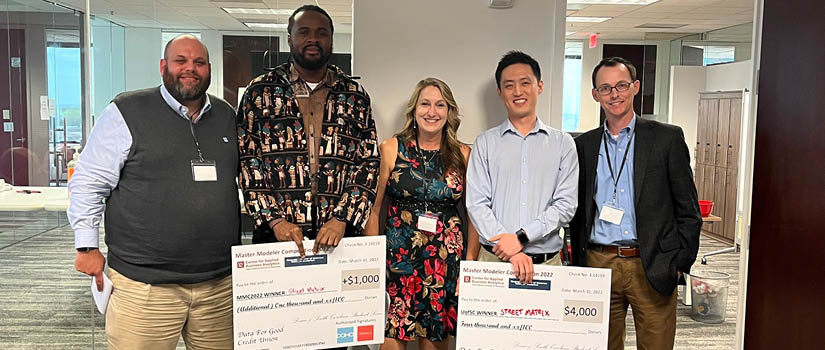USC Ph.D. candidates earn first place in business analytics contest
Winning first place in the Master Modeler Competition 2022 was only half the victory for USC graduate students Chanyong Yoo and Kevin Enyekwe. Yoo and Enyekwe were also proud to potentially offer a solution to help youth homelessness in their real-world analysis for the competition.
They competed against two finalist teams from USC and three finalist teams from Georgia Tech to provide a solution for the same project. The Master Modeler Competition 2022 was hosted by the Moore School’s Center for Applied Business Analytics, in collaboration with the Master of Science in Analytics program at Georgia Tech. Domo software company and South Carolina Student Loan sponsored prizes and travel while Axis Group sponsored the space for the competition.
For the competition, Yoo, a third-year Ph.D. in Business Administration candidate with a concentration in international business, and Enyekwe, a second-year Ph.D. in Chemical Engineering candidate, were tasked with developing a model predicting the U.S. Department of Housing and Urban Development voucher adoption for foster youths aging out of the system who were at risk of being homeless.
“Solving this question is important because we strongly believe every person should be allowed to pursue what they want to do in their life,” Yoo said.
To begin the challenge, Yoo and Enyekwe compiled information from the National Center of Housing and Child Welfare to determine the correlation between youth homelessness and the housing voucher system that serves teens aging out of the foster care system.
“Approximately 20,000 young people age out of the foster care system every year as they become 18 years old, and up to one-third become homeless,” Enyekwe said. “These former foster youths are eligible for a housing choice voucher called Foster Youth to Independence, but the problem is that only a few public housing agencies have been requesting and distributing this voucher to cover the community’s needs.”
To provide the best solution to the problem, Yoo and Enyekwe conducted interviews with housing agencies in South Carolina and went through massive amounts of records data and research papers on the subject.
“Our interviews gave us a lot of detail to get to the bottom of the problem and set our project in the right direction,” Yoo said. “We also went through previous records of other data science competitions, academic papers and data analytic works that are present in the open-source repositories.”
After conducting their research, Yoo and Enyekwe presented multiple solutions to help solve the youth homelessness issue. One of their ideas was to teach foster care youth self-sufficiency programs, especially housing opportunity education, before the foster children age out of the system. Another idea they presented was to replicate high housing voucher adoption practices in low voucher adoption areas.
The joy of victory came with a lot of emotions, Enyekwe said. He says the long hours and constant research were all worth it to help find solutions to a real-world widespread problem.
“It was a roller coaster of emotions, doubts, indecisiveness, trial and error and everything in between,” Enyekwe said. “I feel fulfilled, knowing how much work we put in and most importantly knowing that we are helping make the world a better place by preventing these former foster youths from possibly being homeless.”
In using business analytics skills by making sense of large data sets, Yoo said his time so far in the Moore School Ph.D. program was able to provide him with the necessary skills needed to give their team an edge in this competition. Enyekwe also said his time with the College of Engineering and Computing prepared him for the competition.
“As an international business doctoral student at the Moore School, I have learned how to approach a problem from a multifaceted perspective,” Yoo said. “Having this perspective, I could identify, collect and incorporate various sources of information and data.”
“With the College of Engineering and Computing, I have gained advanced skills in things like writing, research, data and information acquisition, problem identification and analysis,” Enyekwe added.
In the future, Yoo said he would like to become an academic researcher focusing on entrepreneurship in developing economies. He says his participation in the Master Modeler Case Competition helped him hone his data analysis skills needed to achieve this goal.
"Research in developing economies context is often challenged by scarce and imprecise data,” Yoo said. “I want to become a researcher who is capable of identifying and utilizing diverse types of unstructured data. This competition gave me a perfect opportunity to test my skills."
For Enyekwe, this competition opened his eyes to those who live in disadvantaged circumstances.
“I’ve realized how much of a difference we can make by applying our knowledge to societal problems and providing solutions to these issues,” Enyekwe said. “During this project, I have learned more and challenged myself to acquire more diverse knowledge.”
-James Culbertson
